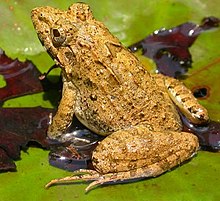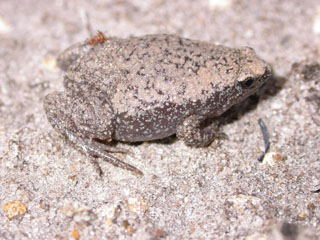
The Microhylidae, commonly known as narrow-mouthed frogs, are a geographically widespread family of frogs. The 683 species are in 57 genera and 11 subfamilies.

Conraua, known as slippery frogs or giant frogs is a genus of large frogs from sub-Saharan Africa. Conraua is the only genus in the family Conrauidae. Alternatively, it may be placed in the family Petropedetidae.
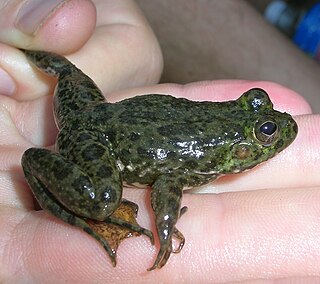
Euphlyctis is a genus of frogs in family Dicroglossidae distributed from the southwestern Arabian Peninsula, Pakistan and Afghanistan to India, Nepal, through Myanmar and Thailand to Malaya, and Sri Lanka. None of the four species assessed by the IUCN is considered threatened.

Tomopterna is a genus of frogs from sub-Saharan Africa.
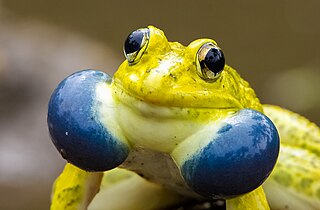
Hoplobatrachus tigerinus, commonly known as the Indian bullfrog, is a large species of fork-tongued frog found in South and Southeast Asia. A relatively large frog, it is normally green in color, although physiological traits vary between populations. Sexual dimorphism exists between males and females. Outside of its native range, H. tigerinus is a rapidly-spreading invasive species. Both adults and tadpoles can severely damage the populations of other frog species. Typically, Indian bullfrogs dwell in wetland environments. Research has been conducted on their ability to control mosquitos.

Phrynobatrachus is a genus of Sub-Saharan frogs that form the monogeneric family Phrynobatrachidae. Their common name is puddle frogs, dwarf puddle frogs, African puddle frogs, or African river frogs. The common name, puddle frog, refers to the fact that many species breed in temporary waterbodies such as puddles.

Lankanectes corrugatus is a species of frog in the family Nyctibatrachidae. It was once monotypic within the genus Lankanectes, until the second species - Lankanectes pera was described in 2018 from Knuckles Mountain Range. It is endemic to Sri Lanka.

Euphlyctis ehrenbergii is a species of frog in the family Dicroglossidae. It is endemic to the southwestern Arabian Peninsula in Saudi Arabia and Yemen. It has been treated as a subspecies of Euphlyctis cyanophlyctis, but is now considered as a valid species. The specific name ehrenbergii honours Christian Gottfried Ehrenberg (1795–1876), a German natural scientist.

The crowned bullfrog is a species of frog in the family Dicroglossidae. It is found in the Sub-Saharan Africa . Its natural habitats are subtropical or tropical moist lowland forest, dry savanna, moist savanna, subtropical or tropical dry shrubland, subtropical or tropical moist shrubland, subtropical or tropical dry lowland grassland, subtropical or tropical seasonally wet or flooded lowland grassland, rivers, intermittent rivers, freshwater lakes, intermittent freshwater lakes, freshwater marshes, intermittent freshwater marshes, freshwater springs, arable land, pastureland, rural gardens, heavily degraded former forest, and ponds.

The frog family Dicroglossidae occurs in tropical and subtropical regions of Asia and Africa, with most genera and species being found in Asia. The common name of the family is fork-tongued frogs.
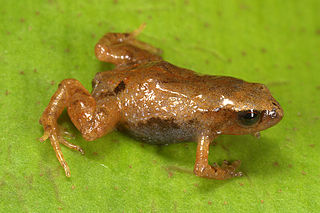
The Strabomantidae are a family of frogs native to South America. These frogs lack a free-living larval stage and hatch directly into miniature "froglets". This family includes Pristimantis, the most speciose genus of any vertebrate.

Strabomantis is a genus of frogs in the family Strabomantidae. At times these frogs have been included in the large genus Eleutherodactylus. They are distributed from Costa Rica southwards to northern South America.
Lankesterella is a genus in the phylum Apicomplexa. Species in this genus infect amphibians, reptiles and birds.

Euphlyctis aloysii is a species of frog in the family Dicroglossidae. It is endemic to Karnataka, southwestern India. It was described from a female holotype from Mangalore, Karnataka.
